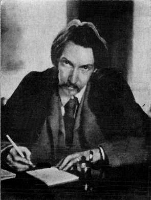Archive for January 2012
Unpublished manuscript problem
A Dialogue on Men, Women and Clarissa Harlowe
In late 1877/early 1878, RLS wrote a kind of Congrevian essayistic dialogue with three people debating Richardson’s Clarissa, combined with thoughts on the difficulties of understanding between the sexes and hence of choosing a marriage partner (the sort of things that we find in several of the Virginibus Puerisque essays).
On p. 3 of the draft MS, we find the following speech:
Bachelor. O I give you Lovelace. There we shall agree. He had a bad heart; a cold and rancid heart; though what a style he wrote, the rogue! and how he knew you women! But I give him up; true or not true, I give him up and heartily disown him; not true, he was a fine, glaring, pasteboard bogy, with a candle in his inside, to fright the public: true — and
well, if we’re to take him for true, he was a sad, unhealthy
dog <del>for</del>; he had no guess of what he wished, to my mind, worked
for wind, worked for disgust. Come, I’ll offer you a bet,and Richardson shall decide it, in a better world, where he walks, escorted by elect females. Had not Colonel Morden stamped him out near Trent, ten to one, he had died of Pthysis[sic].
Problem
Can any reader of the blog solve the problem of the words in red above: “worked for wind, worked for disgust“. The meaning seems to be that Lovelace had a sort of obsessive compulsion to do what actually disgusted him.
“Worked” may be “winked” (but what looks like a dot in the first instance looks, on closer examination, more like a mark on the paper, and no dot is visible in the second); “wind” may be “mind”, but notice how RLS’s “m” always starts with a lead-in hook (as in “to my mind”) and this is absent from the word in question, which has a straight start like all the other examples of “w” in the illustrated fragment.
Any help on this will be gladly received.

